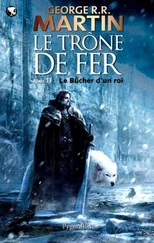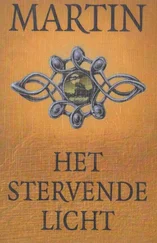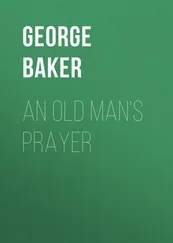Scorpio stared at the huge king for another few seconds, then holstered his burner.
“Who is this?” asked Xabo, indicating Quedipai, who had fainted dead away and lay sprawled on the floor, still clutching the manuscript.
“The one who brought you back to life,” answered Scorpio.
“There will be a place for him in my kingdom,” announced Xabo. He stretched his massive arms. “It is good to be alive again!” He turned back to Scorpio and Merlin. “And who are you, and this creature?”
“We’re his protectors.”
“Now I am his protector.”
Scorpio shrugged. “He’s all yours—once he pays us what he owes us.” He paused for a moment, studying the massive king. “What are your plans, now that you live again?”
“What they always were,” replied Xabo. “I will reestablish my kingdom and bring back the old ways and the old religion.”
You know what I’m thinking. Are you game?
Go ahead , replied Merlin. I’m with you .
“You’ve been away a long time, Xabo,” began Scorpio. “You may not know it, but no other member of your race has survived, and there’s every likelihood that the current inhabitants of the planet may resent your giving them orders, resurrected king or not.”
“What they want makes no difference,” replied Xabo. “It is my destiny to rule, and I will do so with more justice and wisdom than any king has displayed since I was sealed in this tomb.” Suddenly, he glared at the Earthman and the Venusian. “Or do you propose to stop me?”
“Not at all,” replied Scorpio. “This isn’t our world. We don’t have a problem with you … but a lot of people will. People who know their way around today’s Mars and especially today’s weapons.” He paused again to give that time to register. “Like it or not, you’re going to need some help.”
“Are you offering it?” asked Xabo.
“That’s our business,” replied Scorpio. He stepped aside so that Xabo could see the bodies of his warriors strewn across the floor. “And those are our bona fides.” He pointed to Xabo’s neck. “That’s a very pretty gold necklace you’ve got there.”
Xabo strode out of the mausoleum, stared at the bodies, and seated himself on his golden throne. “Let us talk,” he said.
And while Mars slept, the ancient king, the Earthman, and the Venusian settled down for a long night of hard negotiations.
British writer Liz Williams has had work appear in Interzone, Asimov’s, Visionary Tongue, Subterranean, Terra Incognita, The New Jules Verne Adventures, Strange Horizons, Realms of Fantasy , and elsewhere, and her stories have been collected in The Banquet of the Lords of Night and Other Stories , and, most recently, A Glass of Shadow . She’s probably best-known for her Detective Inspector Chen series, detailing the exploits of a policeman in a demon-haunted world who literally has to go to Hell to solve some of his cases, which includes Snake Agent, The Demon and the City, Precious Dragon, The Shadow Pavilion , and The Iron Khan . Her other books include the novels The Ghost Sister, Empire of Bones, The Poison Master, Nine Layers of Sky, Darkland, Bloodmind, Banner of Souls , and Winterstrike . Her most recent book is the start of the Worldsoul trilogy, Worldsoul . She lives in Brighton, England.
Here she sweeps us along on a perilous hunt across the remotest and most dangerous parts of Mars, in a story where nothing and nobody are quite what they seem to be, and nobody’s motives are to be trusted, even for a minute.
Out of Scarlight
LIZ WILLIAMS
THE TRIBES OF THE COLD DESERTS DON’T LIKE ANYONE WHO doesn’t come from their blood. So I knew that they would not care for me, and that was quite apart from who I really was, or what. I rode up out of Scarlight, taking the road that led to the Cold Deserts, on a frost-rimed morning in early winter with the wind they call the Jharain kicking up the dust. I’d kept myself to myself in Scarlight, where the long trail had led me: It’s that kind of a town. I’d taken care to stable my own tope, who didn’t like other people, or even me, much, and he seemed glad to be out of the place as well. I’d spent the previous night awaking intermittently, as an occasional great thump from the stable below alerted me to the fact that the tope was trying to break down the door. So our progress up the mountain trail was brisk until we reached the summit of a ridge and I turned to look back.
Scarlight sits in a narrow valley, at a point where the Yss river is channeled between steps of stone, and cascades down to the canals of the plains in a series of dramatic chasms. At the top of Scarlight itself, an ancient arched bridge sits over one of these waterfalls, which then plummets several hundred feet to a dark pool, and on down through the town. Scarlight is one of those nexus places, where many roads meet, and they say that the pool is filled with the bones of those who have upset the lords of Scarlight.
They’re probably right.
We, however, were following the Yss, and as the tope paused to drink noisily from the tumbling white water, I dismounted via the saddle steps and stood for a moment on dry, golden grass, burned into straw over the summer. Red earth showed parched and cracked: the winter rains had not come into their own, and yet the river was full enough. I looked for tracks, but not much was visible: a mark that might have been half a footprint, some droppings that were clearly from the little verminous ulsas. There was a rank smell in the air, too, which I could not place, and it disturbed me. If I had not made a brief search of the area, I might have missed the tracks altogether, but they lay farther up over a patch of soil—a mount of some kind, traveling fast, and probably carrying more than one person. The footprints were reptilian, however, unlike the splayed feet of a tope. It had followed the river for a few paces, then bounded up over the rocks, and here the trail ended.
Thoughtfully, I rounded up my own mount, climbed back into the saddle, and jogged on. It might complicate matters if anyone else was up here—and by anyone else, I meant Nightwall Dair. Whether he realized it or not, we’d crossed paths all that year, first over the face of the plains, then most recently in Cadrada, and I was getting sick of it. If he knew me at all, it was as a man called Thane, and that cover had seemed to hold. If he found out who I really was, and what—a woman named Zuneida Peace—I was in deep trouble, and I didn’t want that. Zuneida was a former temple dancer, a seductress of princes (and princesses), a poet—a very different person to my taciturn alias Thane, who hid black hair beneath a hat, and drops of juice in his eyes to conceal the blue, who wore a half mask allegedly to hide the damage done by a scar, who spoke as little as possible, and in an accent that betrayed the north.
Half a day later, and we were high up into the slopes of the Khor; another full day, and I estimated that we would reach the edge of the Cold Deserts themselves. I camped that night in the shelter of a high tor of rock, one of the inexplicable piles of stones left by a people long gone, and decorated with the stylized wings of birds. A ban-lion called once, a throaty gasp against the silence of the mountain wall, then the night birds sang. I lay in a fleece wrap and watched the stars wheel over me until I slept and dreamed of warm Cadrada and a night filled with jasmine and golden wine, and of someone, now gone, beside me in the dark.
Next morning, the temperature had dropped another couple of degrees. I washed as best I could in the icy waters of the Yss and brewed tea on a makeshift fire. The tope yawned and snorted in the morning air. Later, high on the slope, I looked down across the plateau that was opening up ahead of me and saw the tiny figure of a rider on a black-furred mount, speeding over the tundra toward a stand of trees. There was something oddly familiar about the mount, and I wondered if I had seen it down in Scarlight. Then it disappeared into shadow and was gone. I skirted the cliff, keeping close to the anonymity of the rock wall, just in case. I knew that the Tribes did not come down this far, preferring the higher plateau of the Cold Deserts.
Читать дальше












